Fixed Bayonets! (1951)
Directed by: Samuel Fuller
Written by: John Brophy, Samuel Fuller
Starring: Gene Evans, Michael O'Shea, Richard Basehart, Richard Hylton
USA
AVAILABLE ON DUAL FORMAT BLU-RAY AND DVD: 16th February, from EUREKA ENTERTAINMENT
RUNNING TIME: 82 min
REVIEWED BY: Dr Lenera, Official HCF Critic
During the first winter of the Korean War, the US forces are pushed southwards by the Chinese volunteers, and an American division is ordered to retreat in preparation for a counterattack. Since the division will be vulnerable as it crosses a bridge, a platoon of 48 men is left to cover the retreat by holding a hill that overlooks the main road. Aware that they have been sacrificed to protect the division, the men of the rearguard dig in and fight hard. Instructed to make the Chinese believe that it is a regiment, the platoon succeeds in delaying the enemy, but each attack produces casualties, steadily depriving the platoon of its leaders. Corporal Denno, who has an innate aversion to responsibility for the lives of others, hopes that he won’t end up the highest-ranking soldier in the platoon….
I can’t say that I’ve sampled very much of director Samuel Fuller’s work – prior to Fixed Bayonets I’d only seen White Dog, The Naked Kiss, The Crimson Kimono and Shock Corridor – but every time I do so I’m highly impressed, so much so that I really need to get my arse in gear and work my way through all his stuff. Fixed Bayonets!, one of several war movies Fuller made, is one of the best films about the subject I’ve seen in some time. Despite the obvious [if still quite good] studio sets which can often tend to make older movies of this nature seem overly claustrophobic, it’s actually quite modern in outlook and feel. In my experience, most American war movies made during and soon after World War 2 felt a need to go on about what its heroes [though I get the feeling that, if you presented this lot with medals for heroism, they’d throw them in your face] were fighting for, and to tell us that there was glory in doing so. Here, there’s no ideology whatsoever, and a soldier’s motivation, something Fuller would have known because he actually served in World War 2, is not a love of God or country but the survival instinct, plain and simple. His film focuses purely on its soldiers, who are all flawed and perhaps slightly stereotypical but rounded human beings nonetheless, and, if they ever do anything heroic, it’s got nothing to do with the Stars and Stripes. The one thing that Fuller really does to be in favour of is guts, because it’s guts which probably keep his characters alive more than anything else.
John Brophy’s 1943 World War 2 novel Immortal Sergeant had already been filmed that year starring Henry Fonda. This second version, updated to the Korean war, came about because Fuller’s previous Korean War pic The Steel Helmet had been a hit, and Fuller, who had just signed a seven-picture deal with Twentieth-Fox Studios, was asked to make a similar movie, which he agreed to do as long as he could follow it with his pet project Park Row. Unusually, studio head Darryl F. Zanuck agreed to let him write his own scripts and Fuller had bigger budgets to play with, but still had to suffer from Zanuck’s usual interference. Rory Calhoun, Jeffrey Hunter, Gary Merrill and Robert Wagner almost starred in it, but Fuller got his way and cast lesser known actors. The film’s first title was Old Soldiers Never Die, taken from a speech by Gen. Douglas MacArthur. The Pentagon didn’t like the way Fuller portrayed soldiery in The Steel Helmet, so they assigned Medal of Honor recipient Raymond Harvey as the film’s technical advisor. The many war films in production made it difficult to hire extras for the opening retreat sequence, so they used dancers from a musical and had them convincingly simulate fatigue and depression by loading their uniforms and packs with heavy weights. The entirely studio shot [on just one stage] film was reasonably successful at the box office.
A master of the opening scene, Fuller does not disappoint here. While driving through snowy mountain terrain, a general and a soldier are shelled by a Chinese bomb. When medics bring the injured men back to base, a couple of grunts comment on the situation. One of them is surprised that a general would put himself in such obvious danger; a general should be smarter than that. The other soldier replies that it takes more than brains to be a general; it takes guts, adroitly setting up the main theme of the movie. Then we see the decision to leave 48 hand picked men to cover a retreat, a retreat that in real life was actually the longest retreat ever by an American army division, and it does seem that the script is more generous to the American senior command than it deserved, though of course difficult decisions have to be made in war all the time. We do though feel extreme sadness at the sight of the 48 men forlornly watching all the others leave. There’s no sense of glory or excitement. Instead, they look extremely worried and extremely miserable.
We then proceed to follow a small group of soldiers from the group as they hole up. They bicker and sometimes even fight each other, but we like this lot anyway. Fuller tends to give them short, terse dialogue rather than lengthy monologues about the girl back home or where they grew up or such, and it’s just enough, allowing us to get to know these men just enough without slowing things down. It’s Corporal Denno we feel we know most about. He doesn’t like the idea of shooting somebody, nor does he want to have to assume command because he doesn’t want to be responsible for bad decision-making which could get people killed. Drawing on his own experiences, Fuller focuses on the harsh reality of soldiers fighting in the winter. The soldiers are always cold, so they literally dream of dry socks. The platoon uses a cave for shelter, and at one point the experienced sergeant makes them take off their boots and socks and put their bare feet together to warm them while explaining the symptoms of frostbite, which is as dangerous an enemy as the Chinese. After a while, it begins to feel so real that you forget things like the mountains being paintings, that there doesn’t seem to be any wind, and that nobody’s breath can be seen in the cold air. We don’t necessarily feel that we’re in Korea, but then the total lack of politics means that this could almost be anywhere, any war. And actually, the obvious artifice could even be said to benefit the film, creating a setting which is very eerie, and it certainly doesn’t hamper what is one of the uncomfortably tense ‘walking in a mine field’ sequences I’ve ever seen, a brilliantly edited and acted bit which genuinely had me on the edge of my seat!
Fuller’s warts and all approach to warfare may seem a little tame to modern eyes, but I reckon that 1951 audiences would still have been shocked by some of the men looking at an [offscreen] severed ear, and perhaps even more the way that the more masculine character tend to be the ones who don’t make it. He even treats the Chinese fairly and with respect. Stylistically the filmmaking isn’t as stylised as in the other Fuller films I’ve seen, but there is a simply superb use of editing which made me jump in a scene where it’s suddenly revealed that the Koreans have killed two of the Americans who are dug in on an outpost. The battle scenes have a genuine ‘you are there’ feel, though they don’t take up as much of the film’s running time as you may expect. The movie is more about waiting for the conflict to come, and psychology – we even get some interior voiceovers [a Zanuck addition, and he was right] which combine with Roy Webb’s subtly moving score, which often mixes familiar military trumpet songs with almost phantasmagoric strings to quietly powerful effect, to make one particular scene near the end rather beautiful, but, outside of the mine scene, the highpoint of it for me is when the Chinese try to unsettle the Americans through bugle playing. The player on the American side quickly picks up the main tune the Chinese have been playing and plays it back to them, really winding the Chinese up.
The actors mostly give quite convincing performances. Richard Basehart has probably his best ever role as the rather messed up Denno, though it’s Gene Evans, coming across as every inch the battle hardened tough guy, who came across the best for me. Two or three of them struggle a little with what are slightly caricatured parts but do well nonetheless. James Dean has a tiny role near the end. Kind of a bridge between the gung ho John Wayne-type war pictures and the “war is total and utter hell” ones that would follow much later, Fixed Bayonets! manages to be both a straight forward look at some ordinary men Doing a very dirty job as well as a war film which works on several levels and ends up being quite touching while totally avoiding sentimentality. In the end it seemed to me to be a very balanced and even handed war movie. I’ve never been a soldier, so I can’t speak from actual experience, but I feel that I finished this movie with more of an idea of what true soldiery is like than when I begun it. Very highly recommended if you like war films!
Rating: 









Fixed Bayonets comes to Blu-ray from Eureka Entertainment with another superb transfer which preserves the integrity of the film’s cinema look while providing as much depth and definition as you could get out of a 1951 black and white movie shot entirely on a studio. Grain seems especially well distributed. While not crammed with special features, I heard 20 minutes of Australian film expert Adrian Martin’s commentary and, as with his talk track on Eureka’s Seconds, he’s a joy to listen to, educational and observant but always remaining easy to understand. I’ll probably listen to the rest this evening.
SPECIALFEATURES
*New 4K restoration by Twentieth Century Fox
*Uncompressed monaural soundtrack on the Blu-ray
*Audio commentary by film scholar Adrian Martin
*Original theatrical trailer
*Gallery of production and publicity photos
*Optional English subtitles for the deaf and hard-of-hearing
*PLUS: A booklet featuring a new essay by critic Glenn Kenny and excerpts from Fuller’s autobiopgraphy ‘A Third Face’

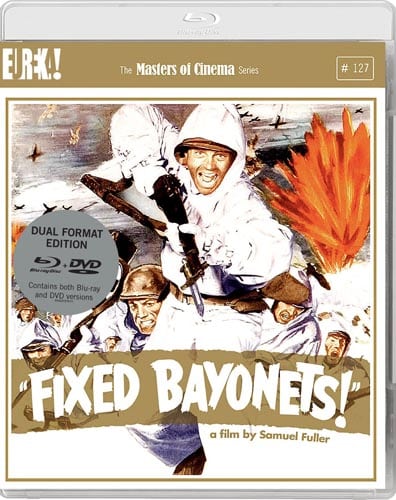
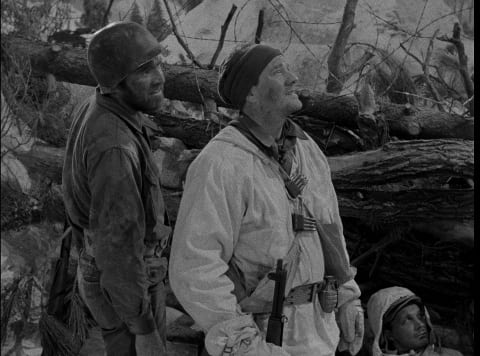
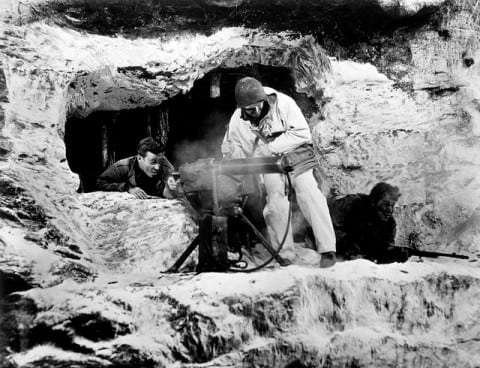

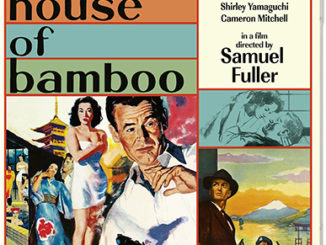
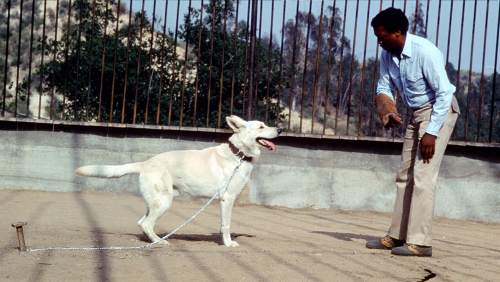
Be the first to comment